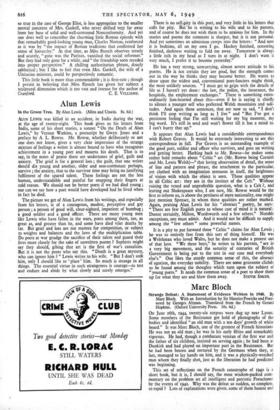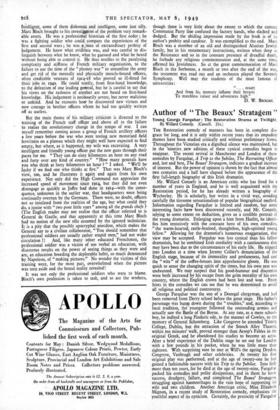Marc Bloch
Strange Defeat : A Statement of Evidence Written in 1940. By Marc Bloch. With an Introduction by Sir Maurice Powicke and Fore- word by Georges Altman. Translated from the French by Gerard Hopkins. (Oxford University Press. 10s. 6d.) ON June 26th, 1944, twenty-six corpses were dug up near Lyons. Some members of the Resistance got hold of photographs of the bodies and identified " an old man with a ten days' growth of white beard." It was Marc Bloch, one of the greatest of French historians. He was not an old man • he was in his early fifties and remarkably vigorous. He had, though a combatant veteran of the first war and the father of six children, insisted on serving again ; he had been at Dunkirk and had played an important part in the Resistance. But he had been beaten and tortured by the Germans when they, at last, managed to lay hands on him, and it was a physically-wrecked man whom they finally shot, just as the liberation he had predicted was beginning.
This set of reflections on the French catastrophe of 1940 is a short book, but it is, I should say, the most wisdom packed com- mentary on the problem set all intelligent and patriotic Frenchmen by the events of 1940. Why was the defeat so sudden, so complete, so rapid ? Lots of explanations were given, some of them honest and Intelligent, some of them dishonest and intelligent, some just silly. Marc Bloch brought to his investialaion of the problem very remark- able assets. He was a professiofial historian of the first order ; he was a fighting soldier who could compare the experiences of the first and second wars ; he was a4man of extraordinary probity of judgement. He knew what evidence was, and was careful to dis- tinguish between what he knew, what he guessed and what he heard without being able to control it. He thus testifies to the paralysing complexity and stiffness of French military organisation, to the failure to use the time of the " phoney war " to streamline the army and get rid of the mentally and physically muscle-bound officers, often creditable veterans of 1914-18 who proved so ill-fitted for their jobs in 194o. He could testify, from first-hand knowledge, to the defeatism of one leading general, but he is careful to say that his views on the rashness of another are not based on first-hand knowledge. His judgement is necessarily severe, but never malicious or unkind. And he recounts how he discovered new virtues and new courage in brother officers whom he had too quickly written off as useless.
But the main theme of his military criticism is directed to the training of die French staff officer and above all to the failure to realise the revolutionary change in the tempo of war. I can myself remember coming across a group of French artillery officers a few years before the war who were testing new motorised field howitzers on a plateau which they might well have expected to find empty, but where, as it happened, my wife was excavating. A very intelligent and friendly young officer put the new guns through their paces for me. " They can do sixty kilometres an hour on any road and forty over any kind of country." " How many generals have you who think at forty kilometres an hour ? " I asked. " We'll' be lucky if we find one who thinks at five." That was Marc Bloch's view, too, and he illustrates it again and again from his own experience. Not only did the High Command not appreciate the increased speed of movement since 3914, but they did not even disengage as quickly as Joffre had done in 1914—with the conse- quence, unknown in the earlier war, that headquarters were being continually overrun by the Germans. There were, no doubt, officers not so insulated from the realitieS of the age, but what could they do, a junior with " two poor little stars " among all the grands chefs? (The English reader may not realise that the officer referred to is General de Gaulle, and that apparently at this time Marc Bloch had no notion of the new role assumed by the ignored technician. It is a pity that the possibly apocryphal anecdote, which makes the General say to a civilian collaborator, " You should remember that professional soldiers are usually rather stupid men," had not-wider circulation I) And, like many -other educated Frenchmen, the professional soldier was a victim of too verbal an education, with disastrous resulti on the power of seeing things as they were and are, an education breeding the deplorable habit, so much denounced by Napoleon, of " making pictures." No wonder the victims of this
training were, for the most part, overwhelmed when the picture . was torn aside and the brutal reality revealed!
It was not only the professional soldiers who were to blame. Bloch's own profession is taken to task, and so are the workers,
though there is very little about the extent to which the current Communist Party line confused the -factory hands, who slacked and dodged. But the abiding . impression made by the book is of its author's probity and candour. It was exemplified to the end. Marc Bloch was a member of an old and distinguished Alsatian Jewish family, but in his testamentary instructions, written when deep in the Resistance and so in the constant presence of dreadful death, he forbade any religious commemoration and, at the same time, affirmed his Jewishness. So at the great commemoration of Marc Bloch in the Sorbonne, a month or two after the end of the war, the testament was read out and an orchestra played the Seventh Symphony. Well may the students of the most famous of universities : •
. . . resort And from his memory inflame their breasts To matchless valour and adventures high."
D. W. BROGAN.







































 Previous page
Previous page